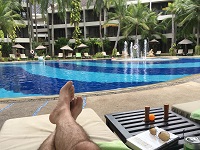A recent paper by BP et-al contains some very inte
Post# of 157749

https://www.biorxiv.org/content/10.1101/2021.06.25.449905v1
Following just my take: the authors defined a PASC score (sensitivity of 97.%):
S1 =(IFN-g + IL-2)/(CCL4-MIP-1b)
The “new” finding, imo is the relevance of CCL4 in the PASC score. The article goes on to elaborate:
Quote:
In PASC, IFN-g and IL-2 would create an immune context favoring
theTh1 polarization, but the low levels of CCL4 affect the recruitment
of these cells thus impairing the antiviral response should SARSCoV-
2RNA or protein persist
Or, in another words, in long haulers IFN-g and IL-2 are properly signaling via inflammation for activation of T-Cells but they are not properly recruited (low CCL4 counts) produced a failed anti-viral response.
So, what does this has to do with us ?? . Reading on:
Quote:
Interestingly, COVID-19 individuals (including PASC, Mild,
Severe) show high levels of CCL5, a chemokine that like CCL4
signals through CCR5. Indeed, the disruption of the CCL5-CCR5
pathway restores immune balance in critical COVID-19 patients .
And here is imo the important finding from this study:
Quote:
In the specific case of PASC, despite the statistically
significant elevation of CCL5 compared to healthy controls, a
reduction in the CCL4-mediated recruitment of activated T cells
is proposed .
And:
Quote:
Signaling through alternative receptors for CCL5. Besides CCR5,
CCL5 can signal through the receptors CCR1 and CCR3
whereas CCL4 effects are restricted to CCR5. It has been shown
that CCL4 can bind to CCR1 but is not able to induce the
intracellular pathway necessary for activating the chemoattractant
stimulus.
Therefore RANTES can signal through CCR5, CCR1 and CCR3 and CCL4 effects are restricted to CCR5. The use of Leronlimab would produce a reduction of the CCL4-mediated recruitment of activated T-cells (proposed as an alleviation to PASC.)
Indeed this is what is being done with the drug (that I will not name here) that has liver toxicity.
Now, is if this was not enough, Leronlimab (CCR5 antagonist) has shown to reduce IFN-g, so, simultaneously Leronlimab should reduce the numerator and increase the denominators of the PASC score.
This is also true not only for PASC patients but, also, for the severe patients (severity score) depicted in the paper.
So, I say we will have some very positive results in the LH and the Critical trials.
Now the question is: will LL ALONE be the optimal treatment for Long-Haulers ???
I say we should be exploring partnership options with other companies that also address some of the parameters recognized as playing a role in the disease (IL-2, IL-6 could be targets).
 (28)
(28) (0)
(0)